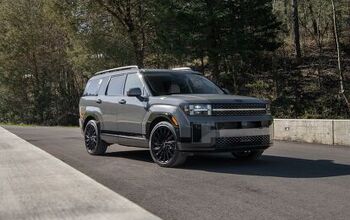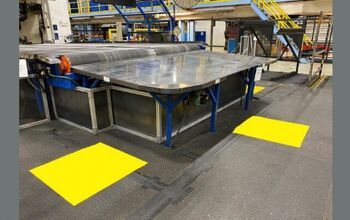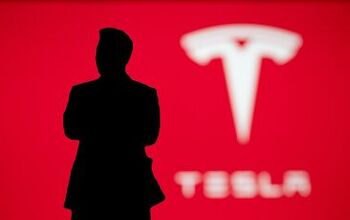Ford and Volkswagen Announce Alliance; Joint Pickup Project Is a Go

Months of speculation and rumors came to an end in Detroit Tuesday, as auto giants Ford Motor Company and Volkswagen Group officially announced they will take their relationship to the next level.
After signing a Memorandum of Understanding last year, initially to explore joint commercial vehicle production, the two automakers now say their pact will birth a midsize pickup truck for global markets. Volkswagen Ranger, anyone?
The alliance doesn’t end there, but commercial vans and the aforementioned truck are the only joint products the two are willing to confirm at this point. It’s possible the efficiency-seeking companies could broaden their relationship to include electric vehicles, autonomous vehicles, and mobility services.
In a joint release, the automakers stated their intention “to develop commercial vans and medium-sized pickups for global markets beginning as early as 2022.”
Unlike the Renault-Nissan-Mitsubishi Alliance, this tie-up does not involve any cross-ownership between the two companies. Overseeing the partnership will be a joint committee, with VW CEO Herbert Diess and Ford CEO Jim Hackett sitting at the top, surrounded by execs from both companies.
“The alliance will drive significant scale and efficiencies and enable both companies to share investments in vehicle architectures that deliver distinct capabilities and technologies,” the automakers stated. “The companies estimate the commercial van and pickup cooperation will yield improved annual pre-tax operating results, starting in 2023.”
It became clear last fall that Volkswagen was interested in Ford’s pickup prowess, with Diess letting slip that ongoing talks between the two companies encompassed that possibility, as well as others. Indeed, the alliance may very well go in on EVs together, what with VW boasting a versatile electric vehicle architecture, as well as autonomous tech, which Ford has spent years and no shortage of bucks pursuing.
“Both companies also said they were open to considering additional vehicle programs in the future,” the joint statement read.
The timing of the truck production is interesting. Just last week, Road & Track published details on the next-generation Ford Ranger, tentatively due out in 2022. Meanwhile, Volkswagen’s overseas-market Amarok, a body-on-frame midsize pickup produced since 2010, is growing long in the tooth. The automaker registered the Amarok nameplate in the U.S. early last year.
Producing a next-gen Amarok using co-funded Ford bones would save VW money compared to a ground-up redesign, and these days VW is all about slashing costs to fund its EV product wave. That wave gets underway in earnest in the 2020-2022 time frame.
In this relationship, Ford would develop and build the VW-badged trucks. As for the commercial vehicles, Ford is also tasked with developing and building larger vans for the European market, while VW would develop and build a smaller city van. The companies insist the respective models will differ from each other in more ways than just a badge.
In a statement, Hackett said, “Over time, this alliance will help both companies create value and meet the needs of our customers and society. It will not only drive significant efficiencies and help both companies improve their fitness, but also gives us the opportunity to collaborate on shaping the next era of mobility.”
Diess echoed Hackett’s words, calling the alliance “a cornerstone for our drive to improve competitiveness.”
[Image: Ford Motor Company, VW Group]

More by Steph Willems
Latest Car Reviews
Read moreLatest Product Reviews
Read moreRecent Comments
- Wjtinfwb Not proud of what Stellantis is rolling out?
- Wjtinfwb Absolutely. But not incredibly high-tech, AWD, mega performance sedans with amazing styling and outrageous price tags. GM needs a new Impala and LeSabre. 6 passenger, comfortable, conservative, dead nuts reliable and inexpensive enough for a family guy making 70k a year or less to be able to afford. Ford should bring back the Fusion, modernized, maybe a bit bigger and give us that Hybrid option again. An updated Taurus, harkening back to the Gen 1 and updated version that easily hold 6, offer a huge trunk, elevated handling and ride and modest power that offers great fuel economy. Like the GM have a version that a working mom can afford. The last decade car makers have focused on building cars that American's want, but eliminated what they need. When a Ford Escape of Chevy Blazer can be optioned up to 50k, you've lost the plot.
- Willie If both nations were actually free market economies I would be totally opposed. The US is closer to being one, but China does a lot to prop up the sectors they want to dominate allowing them to sell WAY below cost, functionally dumping their goods in our market to destroy competition. I have seen this in my area recently with shrimp farmed by Chinese comglomerates being sold super cheap to push local producers (who have to live at US prices and obey US laws) out of business.China also has VERY lax safety and environmental laws which reduce costs greatly. It isn't an equal playing field, they don't play fair.
- Willie ~300,000 Camrys and ~200,000 Accords say there is still a market. My wife has a Camry and we have no desire for a payment on something that has worse fuel economy.
- Kjhkjlhkjhkljh kljhjkhjklhkjh NOBODY BUYS THEM SO NO



































Comments
Join the conversation
Diess will eat Hackett for breakfast and then ask for more. Not even funny. Ford probably has too much cash stashed away that VW can use for the world domination.
There are a lot of moving parts, and the story is in no way finished. From what I have read during the day: The original plan was to have a live, joint, hour long presentation at the Detroit show this morning. That was canceled last night and replaced by a conference call. The news release about the truck tieup was already on the news wires at 8:30am, when the conference call was scheduled to start. Bill Ford was quoted that there may be additional information later this week. In the truck deal, all the vehicles that Ford leads will be produced in Ford plants. The vehicles VW leads on will be produced in VW plants. VW has decided Hannover and Emden will be it's electric vehicle centers. That means existing product needs to find a new home. So, the Transporter will move from Hannover to, in all probability, the Ford Transit plant in Turkey. The Amarok moves from Hannover to a Ford plant building the Ranger, my speculation: maybe Brazil, maybe the Ranger is added to the Turkish plant. The Passat moves from Emden to the Skoda plant in Kvasiny. Thing is, the Skoda plant is already going at full trot, so, to make room for the Passat, VW plans to move the Skoda Karoq and Seat Ateca (versions of the short wheelbase Tiguan) elsewhere. They want to move the Skoda and Seat models to somewhere in eastern Europe where the labor rates are comparable to Czech rates to maintain pricing. Currently examined options are: covert existing engine plant in Poland, convert existing engine plant in Hungary, greenfield plant in Romania, greenfield plant in Turkey. Ford has a plant in Romania, currently producing the Ecosport and appears to be running at less than 50% of capacity. My speculation is there may be negotiations to move the Skoda and Seat products that lose their home in Kvasiny into the Romanian Ford plant. Maybe that is the next shoe to drop, that Bill Ford was hinting at.